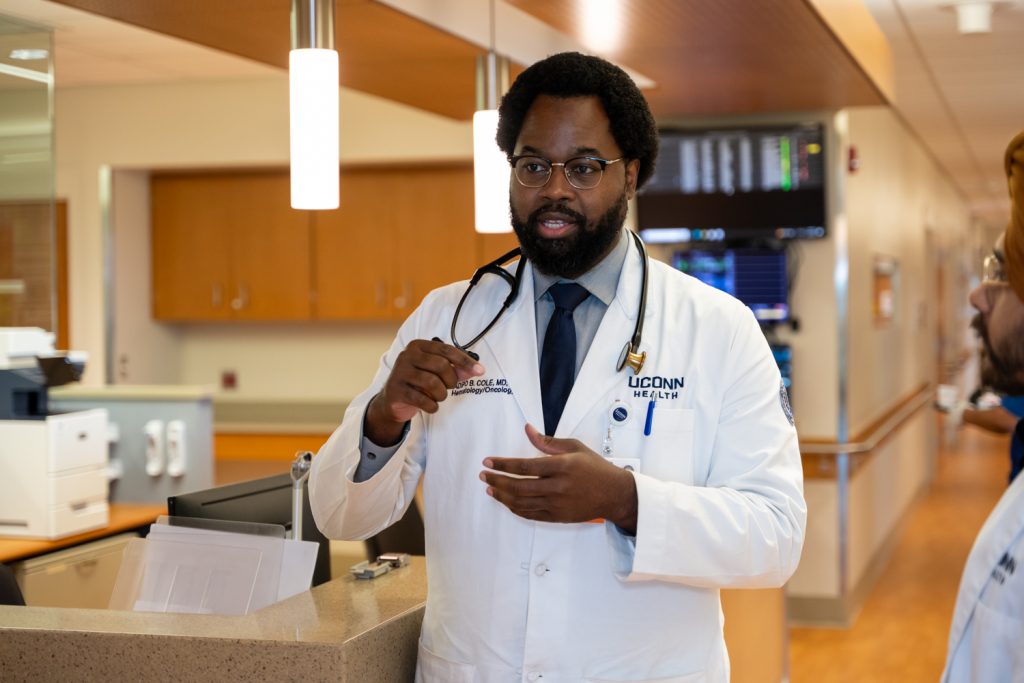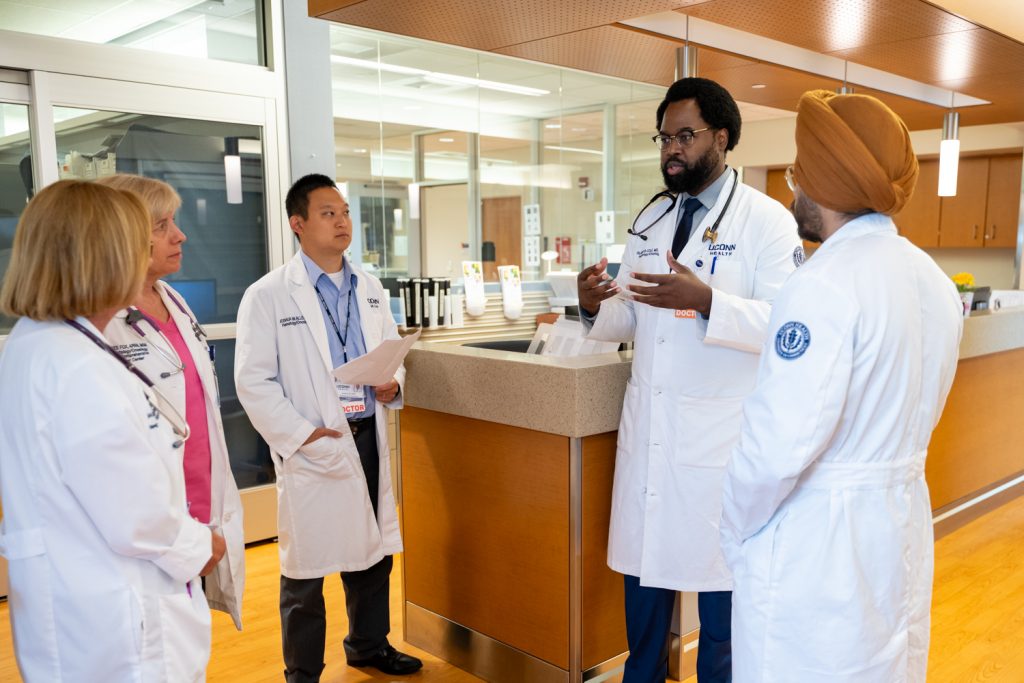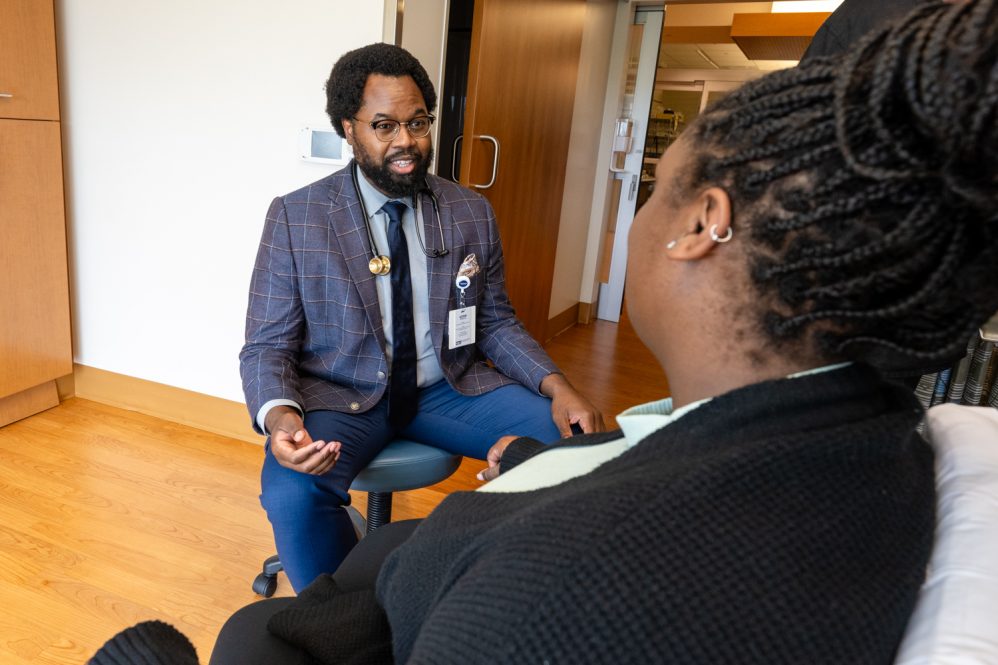Meet hematologist/oncologist Dr. Oladipo Cole, who just joined UConn Health as the new associate director for the growing New England Sickle Cell Institute (NESCI).
“UConn Health is great. I love it here,” says Cole who joined UConn Health in July and serves as an assistant professor of medicine at UConn School of Medicine and associate director of the Connecticut Bleeding Disorders Center at UConn Heath. “Wow, it’s really a special place. It’s where our sickle cell patients have a place to call home for all their inpatient and outpatient care needs.”
Cole says when it comes to sickle cell disease care, it’s all about connecting.

“I connect with people and find ways to connect with my sickle cell patients. As providers, we need to be able to build trust first. Then patients may be willing to try the newest treatments,” says Cole who wants to bring curative and transformative treatments for sickle cell to UConn Health.
Each sickle cell patient he meets describes their individual pain from their disease differently – such as sharp, stabbing, or aching – but they all report that no pain compares to a sickle cell pain episode – not even childbirth.
“Sickle cell causes the body havoc from head to toe,” says Cole who has strong personal connection to the disease which inspired him to become both a doctor and an expert in the sickle cell field.
“My brother had sickle cell,” shared Cole who says patients can still to this day often experience a lot of discriminatory practices and are not believed when seeking care for their painful, inherited, red-blood cell condition.
He also stresses that research for the disease and new therapies have lagged for a very long time until recently.
“I told my brother I am going to find a cure for you,” stressed Cole and he kept his promise. “My brother was able to get a bone marrow transplant. I was part of the medical team that evaluated him. It’s been over a year now, and he’s done phenomenal. He is no longer living in pain, and it has changed his life,” Cole happily reports.
“I don’t want my brother’s success story to be unique. I want it for everyone with sickle cell,” says Cole.
Cole was fellowship trained in hematology/oncology at Washington University School of Medicine, one of the top centers in the country. He’s also been heavily involved in sickle cell research and completed a special NIH fellowship while at the University of Illinois-Chicago.
“It was a great experience. I fell in love with researching curative therapies for sickle cell,” says Cole. “I now hope to advance the work being done to bring them to UConn Health.”

“UConn has the best sickle cell program in the country. I am here at UConn Health because nothing can compare to the New England Sickle Cell Institute and its comprehensive sickle cell care established by Director Dr. Biree Andemariam and her team,” says Cole. “The Institute brings the latest innovative care, supportive services, and clinical trials to our sickle cell patients all in one space that patients can call home. The holistic care and patient resources at UConn Health are second-to-none. The staff at UConn Health pour their skills, talents, and compassion into their care of patients.”
Cole adds, “There is minimal sickle cell stigma here at UConn. Plus, we are training and educating the next generation of health care providers.”
The New England Sickle Cell Institute is the first and only dedicated outpatient regional center of its kind for comprehensively managing the painful inherited red blood cell condition to help adults combat the daily suffering associated with sickle cell disease and improve their overall length and quality of life. The Institute also works to identify more sickle cell patients in the surrounding communities to help them better manage their health, reduce their pain symptoms and disease complication risks, and to keep them healthy so they can enjoy their lives more.
Future of Sickle Cell Care
Cole stresses that it is a very exciting and hopeful time for sickle cell patient care and research.
Currently, the Institute at UConn Health is looking to the future of sickle cell care. Cole and Andemariam, in collaboration with newly recruited Blood and Marrow Transplant Program director Dr. Kapil S. Meleveedu, are working diligently to bring bone marrow transplant offerings to sickle cell patients like the one Cole’s brother successfully had. Also, they are working in earnest to soon bring access to the newly FDA-approved sickle cell gene therapy currently available right now only at a few centers nationwide. They also have several clinical trials open at UConn Health.
Plus, Cole says there are quite a few new drugs approved in recent years for sickle cell and a few more in the pipeline that are promising to finally help bring this debilitating disease to a halt.
“But we can’t bring sickle cell disease to a halt alone,” says Cole. “We thankfully have a lot of support from our patients, advocacy groups, and others but we need more awareness and research funding.”

Hope for a Cure and Pain-Free Hugs
“I think Dr. Cole is amazing,” shared one of his new patients, Joudel Salmon, 37, of Manchester, a longtime UConn Health patient for sickle cell since soon after the adult sickle cell program was established by Dr. Biree Andemariam.
“I transferred over from Connecticut Children’s. I have been with UConn Health for 16 years now,” she says and has been cared for by the Institute’s leader Andemariam and the team of nurse practitioners, nurses, and social workers who help her navigate all her health-related needs.
She applauds the Institute and its care.
“It’s great and so are its forms of communication,” says Salmon. “They give us reminders for appointments and even text messages weeks before our appointments.”
This Sickle Cell Awareness Month Salmon wants to stress one thing to the world: “The word is not out about sickle cell!” she says. “I have come across many people who don’t know what sickle cell is. More awareness should be done.”
When it comes to sickle cell pain and care Salmon says, “Don’t minimize my pain. It’s all about being heard.”
She adds, “Dr. Cole hears us!”
“Living with sickle cell has been rough, and also having others not understand I am in a constant state of pain,” reports Salmon who only is able to give her children air hugs currently due to her painful, daily sickle cell condition. She also needs chronic transfusions once a month at the Institute to reduce her pain crisis experiences.
Salmon is really looking forward to future curative therapies that Cole and the Institute are working hard to bring to UConn Health for sickle cell patients like her, and one thing above all.
“A hug from my children,” Salmon shares.



